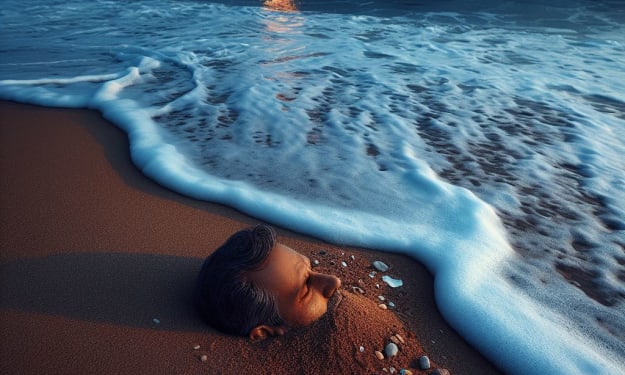
The engine dies somewhere around Seattle - not with a bang of smoke, but with a final choke on its very last fuel. Andy isn’t even surprised. After the hellish couple of days they’ve had, this might as well happen.
She shouts, “The engine just died!” and she almost wishes there was desperation in her voice, but they’ve been doing this for five years. Frustration has just become part of their daily lives.
From under the deck, Peter doesn’t even acknowledge her, which makes her think of those melancholy moods he’d get into when he was painting. In those days, he wouldn’t step out of his studio for days and she’d have to force him to take breaks so he didn’t pass out from exhaustion and hunger. Such beautiful art he made, though. When the neighborhood turned gray, Andy had fit one of his largest canvases to their window so they wouldn’t have to look outside. It was much better to look at the bright splashes of paint that formed an orange, sunset sky.
At least, it reminded Andy of the sky. Peter refused to attribute meaning to anything he painted. He claimed it defeated the purpose.
“You were so pretentious back then, love,” Andy says, shaking her head with something that resembles a smile on her lips, but that lacks the joy and the warmth her smiles used to have. Nowadays, she feels like she’s only pretending to be human, mimicking patterns from a life long lost.
She stands on top of the stairs to the cabin and goes as far as to take a step down but thinks better of it. She doesn’t want to face Peter. Not yet. So she announces, “I’m gonna get started on dinner.”
Andy has been avoiding going downstairs and she knows it, but it feels natural to lie to herself at this point. For seven years she’s been insisting that “everything will turn out okay”. Why be a realist now?
She cooks enough for three, not out of habit, but because the fridge stopped working two years ago and the meat never lasts. It’s better to cook it in large portions and chew the tough, cold pieces over the week. Food is always tasteless and often burned, but eating has long ceased to be a pleasure and become purely a necessity. Something one did to stay alive until they came across their next meal.
The pleasure of food was something Andy gave up quickly and she can’t remember if she misses it or not. Now that humanity is all but extinct and game is bountiful once again, she knows she’s allowed to indulge, but she can’t let go of her stingy ways. Perhaps everything that used to bring her joy simply belongs to the woman she used to be.
Like turning off the engine and just drifting. They used to do that once. Peter would bring her out on the lake at night and they’d just rock with the waves, looking at the stars and pretending life would always go on as usual.
He proposed to her on that boat.
She told him she was pregnant on that boat.
They had their tenth anniversary on that boat, and Peter had put that heart-shaped locket around her neck and whispered something sweet and tastefully obscene in her ear. She’d worn nothing but her new necklace when they made love on the upper deck.
The memory makes her heart ache but only a little. Andy can feel her eyes tearing up, but she knows it’s only because of the smoke from the grill. These days, she feels just like their boat: no will to move forwards, just rocking on the waves, existing for the sake of existence.
She almost wishes for the earlier days of the virus, sometime around the seventh month, when desperation set in and people abandoned their neighborly pretenses and gave in to their most basic instinct. Yes, the chaos had been terrifying, but now Andy thinks back to the time she punched another woman in the nose for trying to steal the last pack of paper towels from her cart in a crowded Walmart and she can’t lie - that felt good. Like fighting for something. Like wanting to live for something.
Peter told her humanity would end the day kindness died, but he’d been wrong. Kindness had always been optional; violence was a human pleasure. They carried on for three years on spite and anger alone. Governments were toppled and people were killed. There was pillaging and fighting and murder, and yet they carried on. When the inevitability of death set in, when blood and fists and guns were not enough to get through the pain, that was when humanity truly gave up.
“Peter, what was it?” Andy asks over her shoulder at the gaping mouth of the stairs that lead below deck. Before he can ask her what she’s talking about, she explains, “The last count? Was it a third left or a third down?”
Peter can’t remember. She can’t either. It was something like that anyway, population severely shrunk and getting smaller by the minute. That was when newsfeeds everywhere dwindled and died. She supposes there were still people pushing through. They’d managed to push through for another two years.
“Alice was twelve then,” Andy says, in a low voice that is solemn but devoid of the emotion it used to have. She stares into the grill and watches the fire. They’d put Alice to rest in the ocean. It felt more respectful that way. People had started digging up graves to eat the dead even though fish was bountiful and deer had made their way into urban centers. Andy guesses they did so out of morbid curiosity now that the social contract was irreparably broken.
After that, Peter couldn’t hear his daughter’s name without crying. Andy still resents him for that. Her heart was shattered so badly when Alice started coughing that she couldn’t conjure a single tear when she died.
What kind of mother can’t cry for her little girl?, she’d thought as they threw Alice overboard.
“Maybe we’ll be next,” Peter said in the smallest, most hopeful voice she’d heard in five years. “We’re in such close quarters… and-and she was so sick. We probably have it.”
“Maybe,” she’d agreed.
They didn’t. Andy wasn’t surprised.
Not much talk was had after that day. Sometimes, she’d see Peter resting on the bow of the boat, staring at the ocean. Some people looked for god when the world ended. Peter looked for Alice. Andy guessed he prayed for her. Or to her.
As for Andy, she busied herself with the boat. Sometimes, she’d hold on to her locket without daring to open it and she’d almost feel something. An ache. A pang. A whisper. Then, her heart went quiet and she let the little memento hang around her neck like it meant nothing.
The stars are out and the night sky is stunning, but Andy takes her dinner and makes her way below deck. Peter is waiting.
“Do you think we’re any closer to Canada?” she asks him. “I really can’t tell. You know how I am with maps.”
She mimics a chuckle like a bad actress, then takes a bite out of her dinner to take away the taste the laughter left in her mouth. The meat tastes like charcoal, but it’s still more flavorful than anything she’s had in three years.
“Doesn’t matter,” she tells him. “They’re not better off than we are.”
She looks at the necklace on Peter’s neck. The locket is on his back and Andy can’t see it, but she doesn’t want to. She knows what it says and it feels like a bad joke.
‘Till the end of time.
Alice’s picture is inside, as faded as the rest of the world.
Andy puts her plate down and stares at the side of his face.
“Why do you think we hold on, Peter?”
She asks a version of this question every other day, thinking that someday an answer will come to her, but it hasn’t happened yet.
“I think I know why you did. You thought you were letting Alice down. Or me.”
He never came out and told her that, but it seemed plausible. He was, after all, a family man. She’d seen him attack a man twice his size with a palette knife when he tried to lure Alice away. He wouldn’t give up on them. That was the kind of man he was.
Andy picks up an index finger and bites it delicately as though she’s savoring a chicken leg. She almost gets the appeal of cannibalism, but the taste falls short of her expectations. Doesn’t make her feel guilty either, which is a shame.
Andy swallows and wipes the corners of her mouth with her fingers. She finally says what she’s been thinking all day.
“Do you think we’re immune?”
It is a terrible possibility and it’s funny that it hasn’t occurred to either of them in five years.
“The whole world coughed their lungs to death, but we held on through everything. Even after Alice got sick.”
Peter doesn’t cry. That’s good. It feels good to state her daughter’s name and just have it hung in the air between them without an expectation of grief.
“If we’re immune, then I’ll be the last one. Did you ever think about that?”
Andy shakes her head. She can’t say she knows what it’s gonna be like to be the last one standing, but she can’t imagine it will be much different from her current reality.
“I did you a favor,” Andy says, and it’s perhaps the cruelest thing she’s ever told him.
Peter can’t speak, but his weight shifts as if on cue and he slides on the bunk. His mutilated arm dangles just above the floor and now his head is resting on his left shoulder, eyes staring into hers. They’re glassy and surprisingly judgmental. His tongue is hanging out and the necklace chain is stuck to his skin. Andy had pulled so hard she thought it was going to snap, but Peter barely put up a fight. She can see the heart-shaped locket on his nape and she feels the urge to straighten it up, but she doesn’t do so. Part of her is scared of touching him again.
At least, until it’s time to eat again.
He’s still staring, with empty eyes and furrowed brows, demanding honesty. He's maybe a few hours away from beginning to rot.
She can’t be more honest than this, but apparently, that isn’t enough.
Andy huffs and takes a big bite out of his thumb, unladylike and projecting as much frustration as if she’d flung his entire hand at him.
“You don’t get a say on my reasons, Peter,” she tells him.
For the first time in years, she can feel the barest hint of emotion making way to her voice and it is anger. Delicious, warm, lively anger.
God, it’s good to feel something again.
About the Creator
Amanda Fernandes
She/Her
Brazilian Immigrant
Writer of queer stories and creator of queer content.
Adapted to The No Sleep Podcast, season 14, episode 21, “The Climb”.
I believe that representation matters and that our community has many stories to tell.






Comments
There are no comments for this story
Be the first to respond and start the conversation.